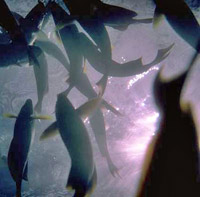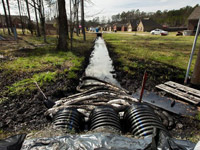
News |
- Green Action Centre Disappointed by Budget
- Canadians More Aware of Man Made Climate Change
- Peguis First Nation Blockades Berger Peat Mine
- Public Misled on Assessment Delays
- British MPs Urge Pesticides Ban
- US Draft Climate Assessment Report Released
- Green Action Center Receives Award of Excellence
- Six Oil Spills In One Week; Business as Usual?
- Exxon Does Not Pay into US Spill Fund
- Yvonne Brill, Renowned Scientist and Manitoban Dies at 88
- Licence Not Recommended by Bipole III Participants
- HudBay Injuction Against Mathias Colomb Cree Nation
| Green Action Centre Disappointed by Budget | 19 April 13 |

"The environment has impacts on every area of life from health and infrastructure to poverty reduction and yet this budget relegates the environment to an area of minor concern," said Josh Brandon, communications coordinator with Green Action Centre. Across the board cuts to (Manitoba) Conservation and Water Stewardship budget leave little room for ensuring Manitoba's environment is safeguarded for future generations. "We agree with The Green Action Centre. Our environment is the basis for our economy. Our government seems to have lost track of this reality. We have to take care of our water and lands for now and future generations. Many government commitments for our environment are now at risk," said Gaile Whelan Enns, director of Manitoba Wildlands. View April 17, 2013 Green Action Centre articleView 2013 Manitoba Budget View Tomorrow Now Manitoba's Green Plan |
|
 Print version Print version |
Top |
| Canadians More Aware of Man Made Climate Change | 19 April 13 |

In the online survey of representative national samples, 58 per cent of Canadians believe that global warming is a fact and is mostly caused by emissions from vehicles and industrial facilities. The proportion of respondents who feel the same way is considerably lower in the United States (47%) and Britain (45%). Three-in-five Canadians (60%) support protecting the environment, even at the risk of hampering economic growth, only 49 per cent of respondents in the United States—and 44 per cent in Britain—concur. View April 18, 2013 AccuWeather.com articleView April 12, 2013 Angus Reid article View April 12, 2013 Yahoo! News article View January 21, 2013 The New York Times article View May 24, 2010 The New York Times article |
|
 Print version Print version |
Top |
| Peguis First Nation Blockades Berger Peat Mine | 19 April 13 |

"It's time for some respect for our lands and waters from the company and the government," Mike Sutherland, Councillor for Peguis First Nation, said. Berger Peat Moss Ltd. is clearing forest and building roads prior to required plant study and inventory. Mike Sutherland said the mine was initially licensed in the summer of 2011 despite a moratorium on new peat mines, and a new license was issued in February despite months of formal appeals and community consultations. The Washow Peninsula is situated within the Treaty Land Entitlement notice area for Peguis First Nation, and is a shared traditional use area for Peguis and Fisher River First Nations. "We have taken every step with the Manitoba government in good faith. This peat mine, and the others intended for the Peninsula, are not right. Our First Nations, and our supporters know we need a real peat mine moratorium in Manitoba. Berger talks one way and acts another way. It is time for some respect for our lands and waters from the company and the government." View Peguis First Nation Press ReleaseView Fisher River Cree Nation letter View April 18, 2013 Aboriginal Peoples Television Network article View April 14, 2013 Intercontinental Cry article View April 14, 2013 Interlake Today article |
|
 Print version Print version |
Top |
| Public Misled on Assessment Delays | 12 April 13 |

After tracking thousands of assessments over a decade, the peer-reviewed findings of Derrick de Kerckhove suggest a great majority of Fisheries Act environmental reviews over the last decade were completed well within recommended timelines. Nor was there a bottleneck of projects being held up by a clogged review process, he said. "We didn't find any. Even when the input was high, it seemed to be handled very well." De Kerckhove, a University of Toronto PhD candidate, analyzed 10 years of data from Department of Fisheries and Oceans annual reports on the progress of environmental assessments triggered under the Fisheries Act. That legislation generates more such reviews than almost any other - anywhere from 7,700 to more than 12,000 in a single year. View April 4, 2013 Sierra Club Canada media releaseView April 4, 2013 The Huffington Post article View April 4, 2013 iPolitics article View April 17, 2012 CBC News article |
|
 Print version Print version |
Top |
| British MPs Urge Pesticides Ban | 12 April 13 |

Britain is blocking attempts to introduce a Europe-wide ban on the world's most widely used insecticides, neonicotinoids, arguing their impact on bees is unclear. British MPs say the government is acting complacently. "We believe that the weight of scientific evidence now warrants precautionary action, so we are calling for a moratorium on pesticides linked to bee decline to be introduced by 1 January next year," said Joan Walley, chair of the committee. The European Commission has proposed neonicotinoid sprays be restricted to crops not attractive to pollinators. Two-thirds of wild species such as honey bees, considered vital for pollinating around one-third of the world's crop production, have suffered population declines in Britain, the parliamentary committee said. View April 12, 2013 Wired.com articleView April 11, 2013 Forbes article View April 5, 2013 Reuters article View April 5, 2013 UPI.com article View May 8, 2012 The Guardian article |
|
 Print version Print version |
Top |
| US Draft Climate Assessment Report Released | 12 April 13 |

'Climate change produces a variety of stresses on society, affecting human health, natural ecosystems, built environments, and existing social, institutional, and legal agreements. These stresses interact with each other and with other non-climate stresses, such as habitat fragmentation, pollution, increased consumption patterns, and biodiversity loss. Addressing these multiple stresses requires the assessment of composite threats as well as tradeoffs among the costs, benefits, and risks of available response options.'. - from the report View National Climate Assessment Development Advisory Committee websiteView March 18, 2013 The Georgetown Public Policy Review article View January 31, 2013 Cornell Chronicle article View January 11, 2013 Daily Kos article View April 12, 2013 Climate Progress article |
|
 Print version Print version |
Top |
| Green Action Center Receives Award of Excellence | 12 April 13 |

The Green Action Center received a Manitoba Excellence in Sustainability Award in the category of pollution prevention and product stewardship. Environmental awards are made annually by the Manitoba Round Table for Sustainable Development. The presentation was made by the Honourable Gord Macintosh, Minister of Conservation and Water Stewardship, in a ceremony at the Manitoba Legislature April 3, 2013. The award reflects hard work by the Board and Policy Committee of Green Action Centre and by project staff to encourage recycling, composting, green commuting options like cycling and walking, energy conservation and other habits of sustainable living. Executive Director Randall McQuaker has lead the organization through many projects to strong programs. The award confirms his hard work and leadership! View April 3, 2013 Government of Manitoba news releaseView Green Action Centre website View Green Action Centre information page |
|
 Print version Print version |
Top |
| Six Oil Spills In One Week; Business as Usual? | 5 April 13 |

Source: Jacob Slaton, Reuters
The spills have come at a tenuous time for the oil and pipeline industries, as US President Barack Obama prepares to announce his final decision on the proposed Keystone XL pipeline from the Alberta tar sands to Port Arthur, Texas. Enbridge recorded its fourth spill in two months along its Norman Wells Pipeline through the Northwest Territories. ExxonMobil's Pegasus Pipeline coated the streets of Mayflower, Arkansas, with diluted bitumen from the Alberta Tar Sands - the same kind the proposed Keystone XL would carry. In Alberta, Suncor was furiously downplaying a leak from one of its massive waste ponds into the Athabasca River. This comes on the heels of a leaked memo to Canada Resources Minister Joe Oliver, which acknowledged routine spillage from these ponds throughout the tar sands. Michigan was hit with another spill - this time up to 500 gallons of hydraulic oil spilled into the Lansing Grand River during an equipment malfunction at a local utility. Does so many spills in one week mean spills are just business as usual for the oil companies? View April 4, 2013 CBC News articleView April 4, 2013 The Huffington Post article View April 3, 2013 The Common Sense Canadian article View March 31, 2013 ThinkProgress article View March 27, 2013 The Huffington Post article View April 5, 2013 RT.com article |
|
 Print version Print version |
Top |
| Exxon Does Not Pay into US Spill Fund | 5 April 13 |

According to the thirty-year-old law, in the US, diluted bitumen coming from the Alberta tar sands is not classified as oil. Pipeline operators planning to transport the corrosive substance across the US – with both old and new pipelines like the Keystone XL - are exempt from paying into the federal Oil Spill Liability Trust Fund. Environmental impacts of the oil spill in central Arkansas began to come into focus as officials said a couple of dead ducks and 10 live oily birds were found after an ExxonMobil Corp. pipeline ruptured last week. "I'm an animal lover, a wildlife lover, as probably most of the people here are," Faulkner County Judge Allen Dodson told reporters. "We don't like to see that. No one does." Dodson said emergency crews prevented the oil from entering waterways. The judge issued an emergency declaration following the spill and is involved in coordinating clean-up efforts among federal, state and local agencies and Exxon. The Exxon pipeline will not operate until the court says it can hold diluted bitumen again. View April 2, 2013 DeSmog Canada articleView April 2, 2013 ThinkProgress article View March 30, 2013 Inside Climate News article View June 26, 2012 Inside Climate News article View July 29, 2011 DeSmogBlog article View United States Environmental Protection Agency Oil Spill Liability Trust Fund page |
|
 Print version Print version |
Top |
| Yvonne Brill, Renowned Scientist and Manitoban Dies at 88 | 5 April 13 |

Source: The New Yorker
Brill grew up in a suburb of Winnipeg and attended the University of Manitoba, where she was barred from the engineering program because she was a woman. So she studied mathematics and chemistry instead. She first landed a job at Douglas Aircraft in California but took time off her career in the 1950s to raise her three children. Brill contributed to the propulsion systems of spacecraft from the first weather satellite TIROS to the Mars Observer, and she was awarded the National Medal of Technology and Innovation in 2011 by President Barack Obama. Ms. Brill is believed to have been the only woman in the United States who was actually doing rocket science in the mid-1940s, when she worked on the first designs for a U.S. satellite. Yvonne Brill passed away in Princeton, N.J., Wednesday, March 27) of complications of breast cancer. View April 2, 2013 The Globe and Mail articleView April 1, 2013, Space.com article View April 1, 2013 The New Yorker article View March 31, 2013 CTV News article View October 27, 2011 Winnipeg Free Press article |
|
 Print version Print version |
Top |
| Licence Not Recommended by Bipole III Participants | 22 March 13 |

After 9 weeks of hearings, with a 3 month adjournment to prepare environmental statement for three BiPole III route changes, common ground among hearing participants were obvious. Participants asked the CEC to not recommend a licence until insufficiencies and problems in Manitoba Hydro technical work are deal with. The CEC has 90 days to prepare its report for the Conservation Minister. The Chair indicated its report would be made public 10 days after delivery to the Minister. View Manitoba Wildlands Manitoba Hydro Projects: BiPole III CEC Hearings pageView March 12, 2013 Gaile Whelan Enns, Director, Manitoba Wildlands, closing statement in Bipole III hearings View Manitoba Wildlands Bipole III Events, Decisions, Documents Chart |
|
 Print version Print version |
Top |
| HudBay Injuction Against Mathias Colomb Cree Nation | 22 March 13 |

HudBay claimed protesters from First Nation created a safety risk to employees by blocking the entrance to its Lalor Lake gold, zinc and copper property, which is being developed near Snow Lake, Man. Protesters from the demonstrations state it was HudBay who closed its gate and at no time did they obstruct the entrance to the property. MCCN maintains the proposed Lalor Lake project is on unceded territory and HudBay did not obtain consent to extract resources. HudBay claims MCCN Chief Dumas and others have caused economic loss to the company as well as "irreparable harm" from loss of productivity and added safety risk to its employees. In a release after the hearing granting HudBay the injunction on March 20, Dumas said the First Nation's lawyer "was not permitted to finish any of his arguments, was constantly interrupted and not permitted reasonable time to review surprise affidavits filed by HudBay lawyers." Dumas continued, "The judge made most of HudBay's arguments for them and allowed their lawyer uninterrupted presentation time. MCCN never surrendered its rights to the land and resources. " Chief Dumas accuses the province and HudBay of not consulting the First Nation or seeking consent to mine in what he says is its traditional territory. The injunction prevents Dumas, members of the First Nation and Idle No More activist Pamela Palmater from entering the mine site. View March 21, 2013 Winnipeg Free Press articleView March 18, 2013 Idle No More Manitoba blog post View March 18, 2013 Winnipeg Free Press article View March 18, 2013 CBC News article View March 8, 2013 Thompson Citizen article View January 28, 2013 CBC News article |
|
 Print version Print version |
Top |


 RSS Feeds:
RSS Feeds: